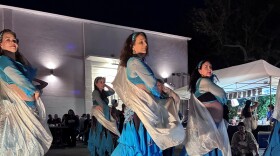Law enforcement agencies could use drones to survey crowds, assist in traffic management, and collect evidence at a crime scene or traffic crash. That's under a proposal that passed a Senate vote and is heading for a House vote. But some lawmakers have raised concerns over how the bill could impact someone's privacy.
The bill allows officers to use drones to get an aerial perspective of a crowd of 50 or more people. Its sponsor, Sen. Tom Wright (R-Port Orange), says the measure could help protect protestors.
"And it allows law enforcement agencies additional time to be able to respond if they see from the drone height that something's coming at those people and they're not being allowed to protest publicly, privately, and safely," Wright says.
But Sen. Jeff Brandes (R-St. Petersburg) had reservations about the bill during its last Senate committee stop:
"Are we going to be okay with law enforcement flying drones up and down the beach because there's a gathering of more than 50 people there?"
Brandes offered an amendment that would put more regulations in place for how law enforcement can use drones. Under that amendment, if an officer wants to use a drone to survey crowds, they must first get written authorization from their agency head to do so. And each agency must have guidelines for storing, retaining, and releasing any images or video captured by the drone, as well as policies and procedures that address personal safety and the constitutional protections of the people being observed. The amendment was adopted, but Brandes says he's still worried about how the law could be applied:
"When we talk about people who have a second amendment rally, is that going to allow drones to fly over our second amendment rally? If there's a pro-life demonstration going on, are we going to throw drones up to see what's going on there or other types of demonstrations that could go on?"
Brandes says lawmakers need to watch the issue very carefully, especially when it comes to pairing drones with facial recognition technology.
"And now, all of a sudden, I know everybody at the crowd or a college party where I know I could tie it to the data base at the school, and I could know everybody at that party and potentially see a red solo cup and somebody underage tanned—we start to get into some really interesting and challenging privacy issues," Brandes says.
Despite his concerns, Brandes voted up on the bill during a Senate floor vote, as did 38 other lawmakers. Wright's proposal has also gained support from law enforcement associations and sheriff's departments like the one in Pinellas County. Its Sheriff Bob Gualtieri says drones could allow officers to see the size of a crowd.
"And whether there's peaceful protesting or whether there is any unlawful activity going on as it relates to riots or people threatening others where we don't have to get in the middle of it," Gualtieri says.
Gualtieri says officers don't want to get in the middle of protests if they don't have to.
"Sometimes our presence—they don't want it—and that's fine as long as they are acting peacefully. So it's a real easy way for us to make that determination and not worry about it," Gualtieri says.
As for facial recognition technology, Gualtieri says he hasn't heard of anyone wanting to use that with drones.
Copyright 2021 WFSU. To see more, visit WFSU. 9(MDAyMTYyMTU5MDEyOTc4NzE4ODNmYWEwYQ004))




